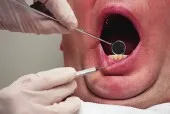Bacteria involved in cavity formation may have some cancer-protective effect, researcher says, but skeptics aren't sure
WebMD News from HealthDay

By Steven Reinberg
HealthDay Reporter
THURSDAY, Sept. 12 (HealthDay News) -- People with more cavities in their teeth may have a reduced risk for some head and neck cancers, a new study suggests.
That's because lactic acid bacteria produced by cavities may be protective against cancer cells, the study authors said.
"This was an unexpected finding since dental cavities have been considered a sign of poor oral health along with periodontal disease, and we had previously observed an increased risk of head and neck cancers among subjects with periodontal disease," said lead researcher Dr. Mine Tezal, an assistant professor at the University at Buffalo, State University of New York.
Tezal was quick to note, however, that the finding doesn't mean people should let cavities develop in hopes of preventing these cancers.
"The main message is to avoid things that would shift the balance in normal microbial ecology, including overuse of antimicrobial products and smoking. Rather, you should maintain a healthy diet and good oral hygiene, by brushing and flossing," she said.
The report was published Sept. 12 in the online edition of JAMA Otolaryngology -- Head & Neck Surgery.
For the study, Tezal's team evaluated 399 patients with head and neck cancers, comparing them to 221 similar people without cancer.
The investigators found that the people with the most cavities were the ones least likely to have head and neck cancer, compared to those with the fewest cavities. Those with the most cavities had a 32 percent lower risk even after factors such as sex, marital status, smoking and alcohol use were taken into account.
"It is important to point out that missing teeth and decayed filled teeth, a widely used measure of tooth decay, were not associated with head and neck cancers," Tezal said.
Cavities are caused by lactic acid produced by bacteria such as streptococci, lactobacilli, actinomycetes and bifidobacteria, the same kinds of bacteria used in yogurt production, Tezal said.
"These bacteria have important roles in digestion, as well as in local mucosal and systemic immunity, and their reduction has been associated with chronic inflammatory diseases, allergies, obesity and cancer," she said.
Tezal said these bacteria could be a key to preventing some head and neck cancers.
"We could think of dental cavities as a collateral damage, and develop strategies to reduce their risk while preserving the beneficial effects of the lactic acid bacteria," she said.
However, Dr. Joel Epstein, a diplomat of the American Board of Oral Medicine who was not involved with the study, said its "limitations are many." Among these were the small study size and focus on current cavities only.
"Tooth loss early in life is typically related to cavities and trauma, and late due to periodontal disease, and this was not assessed in the study," said Epstein, a consultant with the division of otolaryngology and head and neck surgery at the City of Hope, in Duarte, Calif.
source : Tooth Cavities Linked to Lower Risk of Head, Neck Cancer in Study








